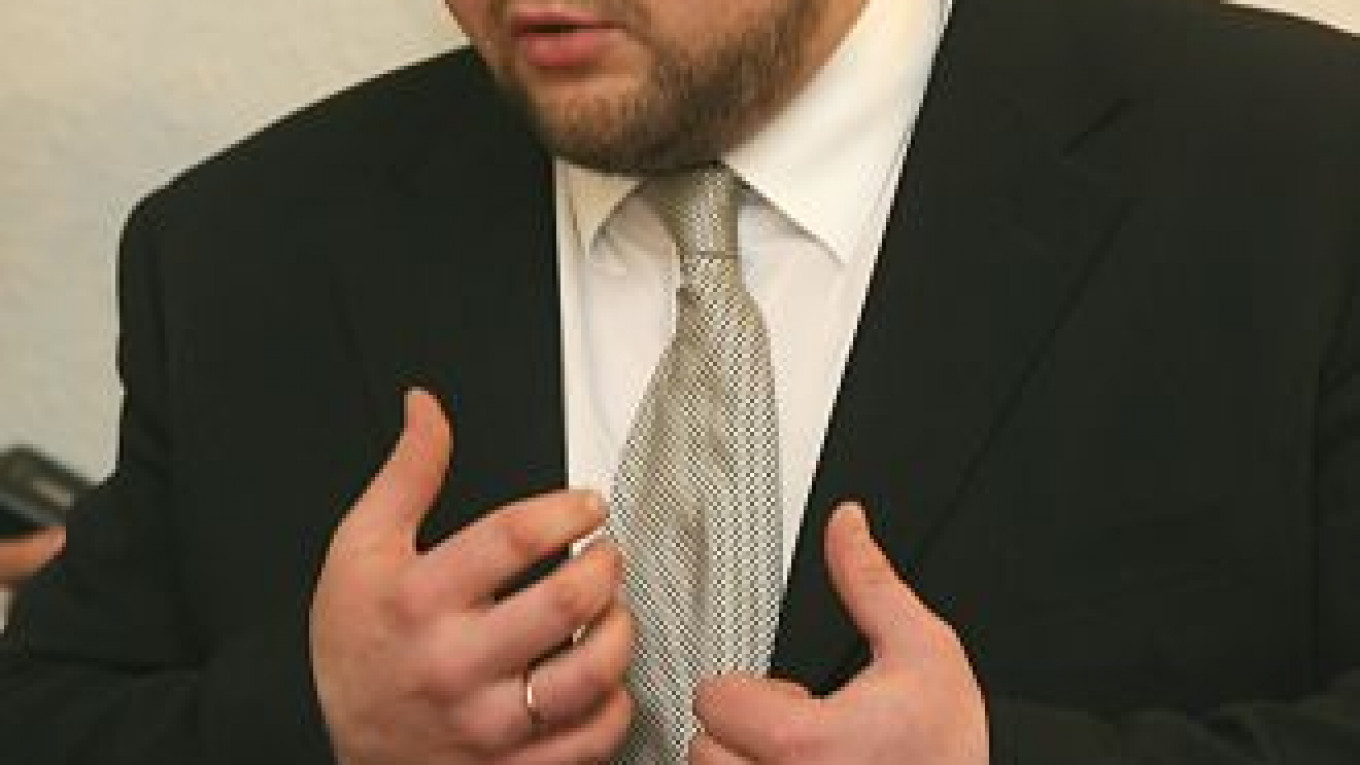Moscow authorities have questioned Kirov Governor Nikita Belykh on suspicion of misappropriating more than $3.5 million from a now-defunct opposition party and giving the money to a firm founded by protest leader Alexei Navalny, Vedomosti reported Thursday, citing an undisclosed police source.
Given that the leak about Belykh's questioning came a day after another protest leader, Sergei Udaltsov, was interrogated and had his apartment searched over suspicions that he was plotting riots, the events appeared to signal a renewed crackdown on political opposition.
Investigators from Moscow's economic crimes unit questioned Belykh earlier this month as part of a check into whether in 2007 he unlawfully paid 108.7 million rubles in Union of Rightist Forces funding to Navalny's now-defunct firm Allekt to advertise his party ahead of State Duma elections.
The firm's charter documentation allegedly did not include advertising services. Kirov region authorities have questioned Belykh on similar accusations, Vedomosti reported without saying when such questioning had occurred.
Neither Kirov region authorities nor those in Moscow had made an official statement about Belykh's questioning by late Thursday. Law enforcement representatives from both locales refused to comment to Vedomosti.
On Thursday, Belykh wrote on his LiveJournal blog that there were no legal violations in his party's campaign, adding that the Union of Rightist Forces had filed all financial reports with the Central Elections Commission and the Justice Ministry on time.
"If anyone remembers what the [authorities'] attitude toward the Union of Rightist Forces was at the time, you would have no doubt that if there had been any violations, they would have been found at once in 2007," Belykh wrote.
Navalny told Vedomosti that Allekt provided advertising to the party for a 5 percent commission and did not violate the firm's charter.
Police opened an investigation into Belykh at the request of the head of the Kirov regional legislature, Alexei Ivonin, who is a member of the ruling United Russia party.
Ivonin asked police to examine a hacked e-mail exchange between Navalny and Belykh in 2010, which was published by an anonymous blogger in October 2011. In one of the e-mails, Navalny reminded Belykh that the former leader of the Union of Rightist Forces owed him money.
After the publication of the e-mails, Ivonin soon asked regional police and other authorities to examine them, but local investigators dragged their feet in carrying out his request, he told Vedomosti.
At the time, Belykh denied on his Twitter account that he had paid any money to Navalny's firm, saying his party's advertising campaign had been canceled, Vedomosti reported.
The Kremlin may be trying to "weaken" how Belykh is perceived as a governor, a source close to the Kremlin told Vedomosti.
Belykh's term expires in January, but according to an amendment that President Vladimir Putin signed this month creating a single voting day for regional elections in September, either Belykh will be acting governor until that time or he will be replaced by another temporary governor until the election.
Although Belykh stopped his opposition activities in 2008 and was appointed governor three months later, he remains liberal-minded and is one of the few governors who are not members of the ruling party. Therefore, he may be the main competitor against a United Russia candidate in a gubernatorial election.
But in the "governor survival rating" compiled by the St. Petersburg Politics Foundation and Minchenko Consulting in October, Belykh's chances of being re-elected were considered middling, ranked on the scale at a 3 out of 5.
Belykh's popular support dropped after a mass brawl between Russians and Caucasus natives in the Kirov region village of Demyanovo in late June, the rating said.
In the rating of most powerful governors released in October by Nezavisimaya Gazeta and the Agency for Political and Economic Communications, Belykh came in 79th out of 83.
On Wednesday, hundreds of people gathered in downtown Kirov to speak out against the governor over bad roads and poor road safety, the local edition of the Kremlin-friendly Komsomolskaya Pravda tabloid reported.
The police inquiry into Belykh may also be aimed at Navalny, who is a leader of the anti-Kremlin street protest movement in Moscow.
An anti-corruption lawyer, Navalny already has a criminal case pending against him in a Moscow court in connection with allegations that he stole property from timber producer KirovLes during his time as an adviser to Belykh.
The latest activity by regional police in regard to Belykh may be linked to the appointment in late August of the new regional police chief.
The appointee, Sergei Solodovnikov, who was previously deputy head of the southern federal district police, opened probes in 2008 into Stavropol region leaders of the Just Russia party after they won regional elections. The probes allowed United Russia to regain control of the regional legislature, Vedomosti reported, without elaborating.
But it might well be that Solodovnikov was appointed in particular to deal with Belykh.
Related articles:
A Message from The Moscow Times:
Dear readers,
We are facing unprecedented challenges. Russia's Prosecutor General's Office has designated The Moscow Times as an "undesirable" organization, criminalizing our work and putting our staff at risk of prosecution. This follows our earlier unjust labeling as a "foreign agent."
These actions are direct attempts to silence independent journalism in Russia. The authorities claim our work "discredits the decisions of the Russian leadership." We see things differently: we strive to provide accurate, unbiased reporting on Russia.
We, the journalists of The Moscow Times, refuse to be silenced. But to continue our work, we need your help.
Your support, no matter how small, makes a world of difference. If you can, please support us monthly starting from just $2. It's quick to set up, and every contribution makes a significant impact.
By supporting The Moscow Times, you're defending open, independent journalism in the face of repression. Thank you for standing with us.
Remind me later.


